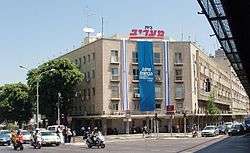Maariv (newspaper)
 | |
|
Maariv front page | |
| Type | Daily newspaper |
|---|---|
| Format | Tabloid |
| Owner(s) | Eli Azur |
| Editor |
Doron Cohen Golan Bar-Yosef |
| Founded | 1948 |
| Political alignment | Centrist[1] |
| Language | Hebrew |
| Headquarters | Tel Aviv, Israel |
| Country | Israel |
| Circulation | About 90,000 |
| Website | Maariv Online |


Maariv (Hebrew: מַעֲרִיב, lit. Evening) is a national[2] Hebrew-language daily newspaper published in Israel. It is second in sales after Yedioth Ahronoth and fifth in readership after Israel HaYom, Yedioth Ahronoth, The Jerusalem Post, and Haaretz.[3] From Sunday to Thursday the newspaper is printed under the Ma'ariv Hashavu'a (מעריב השבוע) brand, while the weekend edition that is out on Friday is printed under the Ma'ariv SofHashavu'a (מעריב סופהשבוע) brand.
Since May 2014, Maariv's co-editors in chief are Doron Cohen and Golan Bar-Yosef. Apart from the daily newspaper and its supplements, Maariv has a chain of local newspapers with a national scale distribution and magazines division.
History
Maariv was founded in 1948 by former Yediot Aharonot journalists led by Dr. Ezriel Carlebach, who became Maariv's first editor-in-chief. It was the most widely read newspaper in Israel in its first twenty years.[2]
For many years, the Nimrodi family held a controlling stake in Maariv, and Yaakov Nimrodi served as its chairman. In March 2010, Zaki Rakib bought a 50% share from Israel Land Development Company and Ofer Nimrodi, bringing new energy and a much needed cash infusion to the newspaper, which had been losing millions of NIS a year since 2004. Rakib became the new chairman.[4]
However, it was announced in March 2011 that Nochi Dankner was to take control of Maariv through his Discount Investment. On 25 March, Discount transferred 20 million NIS to the struggling firm.[5] On 11 September, Maariv's chairman Dani Yakobi issued a statement saying that he would sell the newspaper's printing equipment to be able to pay September salaries. On 7 September, Globes announced that Dankner had reached an agreement with Shlomo Ben-Zvi, publisher of Makor Rishon, to buy out the newspaper. [6] However, the deal faltered, and Dankner turned to the court on 23 September for a stay of proceedings' process. The court appointed a trustee, Shlomo Nass, who ran the newspaper and searched for a buyer. During the following weeks the workers waged a campaign against IDB and Dankner, demanding he honor his obligations to them and pay their salaries, pensions and severance packages in full.

In early November the trustee sold the newspaper to Ben Zvi without the debts or the workers. Ben Zvi kept a fraction of the journalists and commenced a partial convergence process between Maariv and Makor Rishon under his company, Makor Rishon Hatzofe Hameuchad.
As of January 2013, the company Maariv Modiin Ltd. no longer operates Maariv, and until its scheduled closure it will be operated by the court appointed trustee.
In March 2014, after a long struggle to stabilize the company, Ben Zvi turned to the municipal Jerusalem court for a stay of proceedings' process. Maariv closed most of its departments and published only a thin version, until the court appointed trustee could find a new owner. In May 2014 the brand was purchased by Eli Azur, who has holdings in a number of media outlets in Israel, including The Jerusalem Post, Sport1, Israel Post and 103FM radio station. A few days after the deal was approved, Azur relaunched the daily newspaper as Maariv-Hashavua, and a weekend edition called Maariv-Sofhashavua, which is an amalgamation of Maariv and the group's weekend magazine Sofhashavua.
Political orientation
Maariv is associated with Israel's political center and has been critical of Benjamin Netanyahu's center-right government.[7]
Moshe Arens, in a Haaretz opinion piece penned in 2012, wrote that the owner of Maariv had resolved a few years earlier to steer the newspaper leftward, "forsaking the right-wing readership that was loyal to it for years".[8]
Circulation
In a TGI survey for the first half of 2012, Maariv's market share was 11.9 percent.[9] Until 2013 Maariv owned a printing house, which was sold to the newspaper Yisrael Hayom to cover the newspaper's big debts. Since then Maariv has outsourced the printing operations to other printing houses.
Supplements
- Weekdays:
- Hamagazine – daily magazine, including culture and entertainment, crosswords, television and radio listings; used to include opinions
- Asakim – financial section
- Sport section
- Tuesday
- Signon – home magazine
- Wednesday
- Signon – fashion magazine
- Friday
- Musafshabat – in-depth political analysis and commentary
- Sofshavua – weekend magazine
- Journal – culture and entertainment, TV and radio listings
- Asakim – financial magazine
- At – YOU, women's magazine
- A local affiliated weekly newspaper, depending on the region
Notable journalists
Present
- Menachem Ben – literature critic, publicist
- Yehonatan Geffen – columnist
- Mordechai Haimovich – magazine writer
- Tzipi Hotovely – columnist
- Kalman Liebskind – journalist and columnist
- Avi Ratzon – sport commentator
- Ruvik Rosenthal – Hebrew language columnist
- Erel Segal – columnist
- Ben-Dror Yemini – publicist (politics)
Past
- Dahn Ben Amotz – humor, culture, gossip (deceased)
- Kobi Arieli – satirist
- Ben Caspit – political and diplomatic analyst
- Amnon Dankner – chief editor
- Jacob Farkas ("Ze'ev") – cartoonist (deceased)
- Kariel Gardosh ("Dosh") – cartoonist, creator of the "Srulik" ("little Israel") character (deceased)
- Dudu Geva – humor and satire (deceased)
- Jacky Hugi – Arab and Middle East correspondent
- Ephraim Kishon – humor and satire (deceased)
- Tommy Lapid – editor, turned to politics and returned to the paper as a publicist (deceased)
- Ron Maiberg – columnist
- Dan Margalit – political columnist
- Ofer Shelach – political, military and diplomatic analyst, sport commentator
- Meir Shnitzer – TV and film critic
See also
References
- ↑ Fitsanakis, Joseph (5 March 2014). "Israeli reports accuse US of denying entry visas to Israeli spies". Intelnews.org. Retrieved 6 March 2014.
- 1 2 Kershner, Isabel (4 October 2012). "Political and Market Forces Hobble Israel's Pack of Ink-Stained Watchdogs". The New York Times. Retrieved 12 October 2012.
- ↑ "Minister Delivers a Blow to Maariv & Haaretz". Yeshiva World News. 1 May 2014. Retrieved 17 April 2015.
- ↑ "Ofer Nimrodi sells half of Ma'ariv". Globes. Retrieved 1 March 2009.
- ↑ "Dankner to take control of Ma'ariv". Haaretz. Retrieved 28 March 2010.
- ↑ נוחי דנקנר מוכר את "מעריב" לשלמה בן-צבי ב-85 מיליון שקל [Dankner sells "Ma'ariv" to Shlomo Ben-Zvi for 85 million shekels]. Globes (in Hebrew). Retrieved 13 September 2012.
- ↑ Jeffay, Nathan (23 September 2012). "Israeli Media Woes Could Boost Bibi". The Jewish Daily Forward. Retrieved 12 October 2012.
- ↑ Arens, Moshe (12 October 2012). עיתון זה עסק [A newspaper is a business]. Haaretz (in Hebrew). Retrieved 12 October 2012.
זה נכון לגבי 'ידיעות אחרונות' ו'הארץ', ובאחרונה גם לגבי 'מעריב', שבעליו החליט לפני שנים אחדות שהעיתון יפנה שמאלה, ובכך נטש את לקוחותיו הימנים, שהיו נאמנים לו שנים. (It's true for Yedioth Ahronoth and Haaretz, and more recently for Maariv, whose owners decided several years ago that the paper will turn leftward, forsaking the right-wing readership that was loyal to it for years.)
- ↑ "TGI survey: Maariv's exposure grows for the first time in years". Globes. 25 July 2012. Retrieved 25 July 2012.
External links
- Official website (Hebrew)
- Maariv Holdings Ltd. – BusinessWeek
- Online, searchable Maariv editions from the Historical Jewish Press
- Maariv Online is the newspaper's news website. it includes updates from most of the other media outlets owned by the group, such as The Jerusalem Post, Sport 1,2 Radio 103FM and 99FM.

